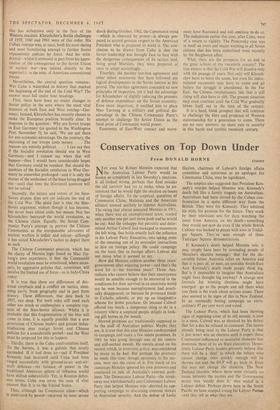Conservatives on Top Down Under
From DONALD HORNE SYDNEY Nor even Sir Robert Menzies expected that the Australian Labour Party would' be beaten so completely in last Saturday's elections. It all looked wrong, perhapS that final mistake the old survivor had yet to make, when he an- nounced that he would fight the election on issues of foreign affairs. To the sceptical, questions of Communist China, Malaysia and the American alliance seemed unlikely to interest Australians. The swing that almost unseated Menzies in 1961, when there was an unemployment scare, needed only another one per cent more push and he would be out. And the unhappy but patriotic and deter- mined Arthur Calwell had managed to manoeuvre the left wing, that holds exactly half the influence in his Labour Party Executive, into taking some of the meaning out of its neutralist instructions to him on foreign policy. He could campaign on the basis that in foreign affairs Labour did not mean what it seemed to say.
How did Menzies achieve another three years' government after enjoying power—and that's the word for it—for fourteen years? Those Aus- tralians who cannot believe that their countrymen would be sensible enough to be interested in the conditions for their survival in an uncertain world say he won because unemployment had practi- cally disappeared; or because he promised funds to Catholic schools; or put up an imaginative scheme for home purchase. Or because Calwell offered too much, a dangerous thing to do in a country where a sceptical people delight in look- ing gift horses in the mouth.
Shrewd promises are traditionally supposed to he the stuff of Australian politics. Maybe they are. It is true that this year Menzies condescended to campaign and make a few astute promises. In 1961 he was going through one of his remote and stiff-necked moods. He merely \stood on his record, which, in economic policy, was considered by many to be bad. But perhaps the promises he made this time, though necessary to his suc- cess, were not the cause of it. For much of his campaign Menzies ignored his own promises and continued to talk of Australia's external prob- lems. The Democratic Labour Party—the break- away and wholeheartedly anti-Communist Labour Party that helped Menzies win—devoted its sup- porting campaign to discussing external threats to Australian security. And the defeat of Leslie
Haylen, chairman of Labour's foreign affairs committee and notorious as an apologist for Communist China, may be significant.
The sceptics also suggested that President Ken- nedy's murder helped Menzies win. Kennedy's death fell like a family tragedy on Australians. Australians had been stirred by the Cuban con- frontation in a quite different way from the British. They were for Kennedy. They admired his style, his promise for the future. They stuck by their television sets for days watching the latest from America on his death—something they would not now do even if the whole British Cabinet was hacked to pieces with axes in Trafal- gar Square. They've seen enough of these Trafalgar Square demonstrations.
If Kennedy's death helped Menzies win, it may simply have been by reminding people of Menzies's election message : that for the dis- cernible future Australia relies on America and that it is part of, or near, an unstable South-East Asia. Kennedy's death made people think big. But' is it impossible to imagine that Australians might have thought big anyway? A strange new formula for winning elections might have emerged : go to the people and tell them what you think is the truth about serious issues. There also seemed to be signs of this in New Zealand. In an outwardly boring campaign an extra- ordinary 97 per cent went and voted.
The Labour Party, which had been showing signs of regaining some of its old morale, is now in a mess. Calwell was so shocked by his defeat that for a day he refused to comment. The lesson already being read to the Labour Party is that it just won't win an election until it expels those Communist-influenced or neutralist elements that dominate three of its six State executives. Demo- cratic Labour Party leaders privately believe that there will be a 'deal' in which the leftists who cannot change sides quickly enough will be thrown out and the DLP will go back in. Even this may not change the situation. The New Zealand election, where there were virtually no issues between the parties and the Government motto was 'steady does it,' also ended- in a Labour defeat. Perhaps down here in the South Pacific we have stopped voting for Labour Parties until they tell us what they are.






































 Previous page
Previous page